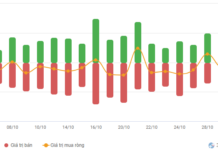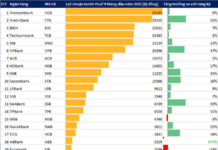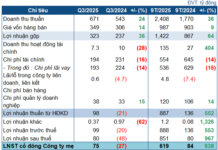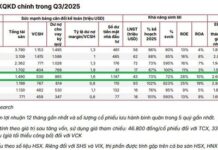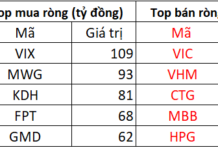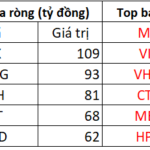The following data was announced at the “Banking Industry Digital Transformation 2024” event held on May 8, 2024.
 |
NHNN Governor Nguyen Thi Hong speaking at the event |
The 2024 Banking Industry Digital Transformation event aimed to spread the positive results of the banking industry’s digital transformation, contributing to the strong national digital transformation and the country’s socio-economic development. This year’s theme, “Expanding Connections and Developing the Digital Ecosystem,” builds on the 2023 theme, “Application of Population Data in Banking Activities – A Driving Force for Digital Transformation.”
Recognizing the importance of accelerating digital transformation, on May 11, 2021, the SBV issued Decision No. 810/QD-NHNN approving the Plan for Digital Transformation of the Banking Industry until 2025, with a vision towards 2030. This decision is considered a significant milestone in defining the direction and implementation plan for the banking industry in the digital transformation trend. Over the past time, the banking industry has been proactive and made efforts to comprehensively transform digitally, including transforming awareness, building institutions, developing technology infrastructure, providing services, and ensuring security and safety.
The digital transformation of the banking industry has achieved remarkable results. In terms of the legal framework, the SBV has studied, issued, and implemented many important policies to promote the digital transformation of the banking industry.
Infrastructure serving the digital transformation of the banking industry has always been a focus of investment, upgrade, and development. The SBV has encouraged credit institutions (CIs) to implement digital transformation, connect and cooperate with different sectors to form and expand the digital ecosystem to provide customer-centric products and services, offering seamless and personalized transaction experiences. CIs and payment intermediary organizations have applied advanced technologies to optimize and simplify business processes, improve operational efficiency and customer transaction experiences, and evaluate and classify customers. They have made decisions on loan disbursement and integrated with various partner ecosystems in different fields. Many basic tasks have been fully digitized (savings deposits, term deposits, opening and using payment accounts, bank cards, e-wallets, money transfers, etc.), and many Vietnamese banks have over 90% of transactions conducted through digital channels. In the first three months of 2024, compared to the same period in 2023, digital banking and payment activities continued to show positive changes. There was a 56.57% increase in the number of payment transactions and a 31.35% increase in value; transactions through the Internet increased by 48.81% and 25.73%, respectively; and transactions through mobile phones increased by 58.7% and 33.12%.
In addition, credit institutions are actively coordinating with enterprises licensed by the Ministry of Public Security to provide solutions for user authentication using chip-based citizen ID cards (CCCD). Many credit institutions have signed contracts and are implementing this: 48 credit institutions have been implementing the application of customer authentication using chip-based CCCD via mobile applications, and 60 credit institutions have been implementing the application of customer authentication using chip-based CCCD via counter devices. Regarding data cleaning, 24 credit institutions have signed contracts with C06 (Police Department for Administrative Management of Social Order – Ministry of Public Security) to deploy offline customer data cleaning; 19 credit institutions are piloting the application of VNeID electronic identification and authentication accounts into the following business lines: opening payment accounts, transaction authentication, customer information verification, and 7 credit institutions have been implementing the solution. The credit scoring solution is being deployed.
In the future, the SBV will continue to coordinate with relevant ministries and sectors to implement synchronously and effectively the solutions in the Project for Developing the Non-Cash Payment Market in the 2021-2025 period and the Plan for Digital Transformation of the Banking Industry. Specifically:
(i) Continue to research and improve the legal framework, mechanisms, and policies on non-cash payments and digital transformation, including a new Decree on Non-Cash Payments and a Decree on the Regulatory Sandbox in the banking sector; complete and issue timely documents and circulars guiding the Law on Credit Institutions and the new Decree on Non-Cash Payments.
(ii) Continue to effectively implement the contents of the Plan for Digital Transformation of the Banking Industry, organize the Banking Industry Digital Transformation Day in 2024, and implement the Plan for Coordination No. 01/KHPH-BCA-NHNNVN (between the Ministry of Public Security and the SBV) to deploy the tasks in Project 06, promoting and facilitating banks and payment intermediary organizations to provide safe, secure, and convenient payment products and services to meet the increasing demands of customers; focusing on connecting with the National Population Database, allowing credit institutions to verify customer information, clean data, and support customers in accessing banking services.
(iii) Continue to promote non-cash payments for public services, especially in the fields of healthcare, education, and social security payments.
(iv) Strengthen the security, safety, and confidentiality of payment and banking activities; coordinate in handling high-tech crimes, implementing security and confidentiality solutions in online payments and bank card payments to protect the legitimate rights and interests of customers; and promote communication and financial education to improve knowledge and skills for the public in using financial and banking products and services.


